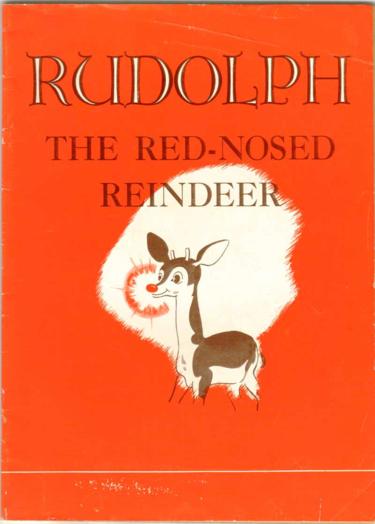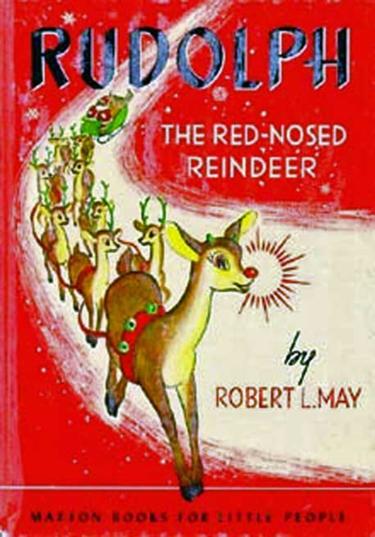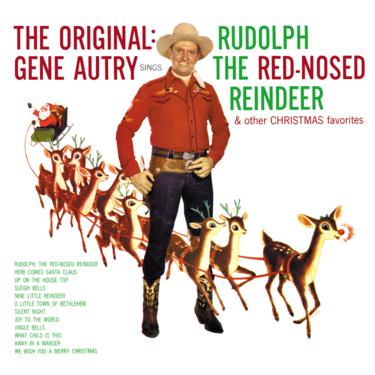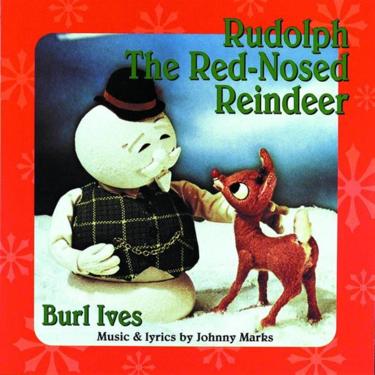Did Montgomery Ward Give the Rights to “Rudolph the Red-Nosed Reindeer” Back to the Story’s Author for Free?
Here is the latest in a series of examinations into urban legends about music and whether they are true or false. Click here to view an archive of the music urban legends featured so far.
MUSIC URBAN LEGEND: The CEO of Montgomery Ward returned the rights to Rudolph the Red-Nosed Reindeer to his creator for free.
There is a dispute over just how Robert May, a copywriter for Montgomery Ward, came up with the story that became Rudolph the Red-Nosed Reindeer. The difference between the two stories is not particularly vast. In one, May is assigned a job by his boss as Montgomery Ward to come up with a story that could be used for a promotional giveaway book for the 1939 Christmas season. In the second, May came up with the story first and then was paid $300 for the rights to the story for use in a giveaway book for the 1939 Christmas season. May himself told the former version of the story in a series of articles over the years (May passed away in 1976). The latter version of the story originated with writer Ace Collins’ Stories Behind the Greatest Hits of Christmas. Collins claims that he was given access to documents from Montgomery Ward (before they went out of business in 2001) that verified his story, and that May was just going along with the story Montgomery Ward wanted (that he created the character as a work-for-hire for Montgomery Ward as opposed to Montgomery Ward buying the character’s rights from May). I could see either story being true, but for the sake of this legend, it does not really matter how we got to the point of Rudolph the Red-Nosed Reindeer being owned by Montgomery Ward so much as we got to the point where Rudolph the Red-Nosed Reindeer was, indeed, owned by Montgomery Ward.
The department store chain produced over 2 million copies of the Rudolph the Red-Nosed Reindeer story as a giveaway in 1939.

It continued to be a popular giveaway until World War II began and the ceased producing the giveaway during the war (for a number of reasons, including the “German-sounding” name of Rudolph and paper raitoning concerns). When the war ended, they started making them again. They had produced 6 million copies by 1946.
Then something amazing happened.
In 1947, May was approached by a book company who was interested in producing a commercial version of the giveaway. May was interested (he had been beset with money problems since his wife Evelyn was diagnosed with cancer in the late 1930s. She passed away in 1938) but he did not own the rights to the property. In an amazing show of generosity, though, Montgomery Ward CEO Stewell Avery (Montgomery Ward was a private corporation) gave the rights to Rudolph back to May (of, if you believe May did the story as a work-for-hire, then he gave him the rights period, no “back” involved).
Rudolph came out as a book from Maxton Books in 1947…

Now don’t get me wrong, Avery did not think that the product was that valuable, as he did not think that there would be a great demand to pay for a book that Montgomery Ward had been giving out for free for eight years by this point. However, the book was popular, so he knew that he was giving May something of value here.
While the books sold well, thinks got a whole lot crazier when May (now with the rights to the character and the book) had his brother-in-law Johnny Marks turn the lyrics of the poem in the book into a song. Marks did so and they shopped the song around to a number of artists (Bing Crosby, king of Christmas songs, turned them down) before Gene Autry agreed to record the tune (even Autry was disinterested – his wife compelled him to record it). Another singer, Harry Brannon, actually released the song first in November of 1949 but Autry’s December 1949 release of “Rudolph the Red-Nosed Reindeer” became the main version of the song. Autry’s tune was a smash hit, making it the number two highest selling Christmas single of all-time (next to “White Chritmas”), a record it held for thirty years or so (I believe “Grandma Got Run Over by a Reindeer” beat it out and I think one of Mariah Carey’s Christmas songs has passed it by since then, as well)….

Interestingly enough, Marks took sole authorship credit for the song, so May did not make anything directly off of the song’s popularity.
Except, of course, that the song’s popularity made the Rudolph property highly valuable and May made a good deal of money licensing the character out for other books, toys, posters, games, comic books, etc. Also, the popularity of the character was demonstrated by the 1964 hit animated TV special…

which was accompanied by Burl Ives’ classic version of the title song….

May retired from Montgomery Ward for a time to manage the Rudolph property, but eventually returned to work for the company. He lived comfortably, though, off of the money that was afforded to him by the success of his character, money that he was able to make due to the generosity of a corporation’s CEO.
Pretty awesome tale, huh?
The legend is…
STATUS: True
Feel free (heck, I implore you!) to write in with your suggestions for future urban legends columns! My e-mail address is bcronin@legendsrevealed.com






Just a minor historical nitpick: WWII started in 1939* (and I’m pretty sure you know that), so when you write:
“The department store chain produced over 2 million copies of the Rudolph the Red-Nosed Reindeer story as a giveaway in 1939.
It continued to be a popular giveaway until World War II began and the ceased producing the giveaway during the war.”,
it sounds a little bit like the war REALLY started when the US entered later, which is not cool with non-americans.
* You could make a point that it started even earlier with the invasion of china, but thanks to eurocentric history it officially started with the invasion of poland.
Of course the war stated 9/1/39 in Poland, and the Japanese invaded Manchuria in 1933…. but what I *THINK* he obviously meant, pertaining to Montgomery-Ward, was the UNITED STATES’ entry into the war, which of course was Pearl Harbor–Dec. 9, 1941. So that’s two Christmases, and perhaps a third if the stock was sitting there ready to go on Dec. 8. Remember, the America Firsters and a lot of Americans were German-friendly until Hitler came back on us for war after we declared on the Japanese… so no, no big impetus to give up on normality til the real deal kicked in “for the duration.”
(Sorry, I obviously meant Dec. 7. How did that 9 get there?)
[…] the more rights you retain, the better off you are is hardly new, but she explains it very well. •Here’s a rare upbeat story about rights: Montgomery Ward owned the rights to Rudolf, the Red-Nosed […]